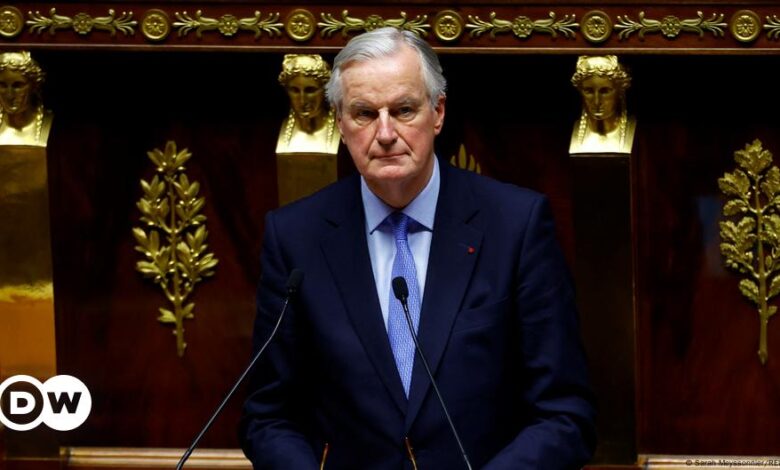France: Lawmakers topple pro-Macron minority government – DW – 12/04/2024

December 4, 2024
Lawmakers vote to oust Barnier’s government
Results are in from the vote in the National Assembly.
A total of 331 members of the parliament voted in favor of the motion. Only 280 lawmakers voted to support Barnier’s government.
That makes Barnier’s government the first to be toppled in this manner since 1962, and the shortest-lived government of France’s Fifth Republic founded by Charles de Gaulle in 1958.
https://p.dw.com/p/4nkdE
December 4, 2024
Macron arrives back in France moments before results
President Emmanuel Macron landed in Paris on Wednesday evening, domestic media reported, returning from his trip to Saudi Arabia just in time for the results.
Macron had been in Riyadh for Tuesday’s One Water Summit and talks on the conflict in Gaza and the Middle East, among other issues.
The president has made clear he intends to try to establish a replacement prime minister and government, likely as quickly as possible, in the event of Barnier’s administration falling.
How this is likely to break the deadlock in parliament is not entirely clear. New parliamentary elections are not possible until the summer.
https://p.dw.com/p/4nkiE
December 4, 2024
Barnier tells lawmakers ‘we are at a moment of truth and responsibility’ in last-ditch appeal
Prime Minister Barnier had the final word in the debate in the National Assembly, appealing to MPs to buck expectations and prop up his government, and warning of risks if they did not.
“We are at a moment of truth,” and of “responsibility,” Barnier said.
He said he had sought “dialogue” with lawmakers to seal a budget amid economic pressure to do so before the new year. He said his proposal had constituted “the best compromise possible” for the budget and the sustainability of the welfare state.
“This motion of censure would make everything more difficult,” Barnier warned.
Barnier again criticized Le Pen, saying their failure to agree terms had showed that “we do not have the same idea of patriotism and of sovereignty.”
After Barnier’s speech, met with applause from his supporters in the parliament, the session adjourned for the votes.
https://p.dw.com/p/4nkgV
December 4, 2024
Paris, Berlin and Washington facing political upheavals
France could join both Germany and the US in ushering some kind of change of government early in 2025 with this week’s developments.
US President-elect Donald Trump will be inaugurated for the start of his second term on January 20, while Germany is set for snap elections, most likely on February 23.
Spending and budget questions were also, at least nominally, at the heart of the breakup of the German three-party coalition last month.
The OECD on Wednesday slashed its growth forecasts for both France and Germany — the EU’s two biggest economies — in light of the economic and political uncertainty.
It’s also a time of major upheaval for NATO and its new secretary general, former Dutch PM Mark Rutte, amid the open questions about what a second Trump term will mean for issues like the war in Ukraine and European defense spending.
https://p.dw.com/p/4nkdD
December 4, 2024
Left-wing LFI also indicates plans to vote down government
Eric Coquerel of the far-left La France Insoumise (LFI) party — the second-largest single faction — also suggested his party would vote to topple the government.
“You will be the first prime minister to be censured since Georges Pompidou in 1962,” he said to Barnier during the session.
If you combine all of the right-wing RN and left-wing LFI members in the National Assembly, and exclude their allies, those two parties command almost as many votes as the government does.
If you add in their allies in smaller parties, mainly more centrist or center-left allies of the LFI, the two blocs command a majority.
However, the two factions in turn agree on almost no budget policies.
https://p.dw.com/p/4nkbQ
December 4, 2024
Le Pen defends opposition to budget, says would approve rollover to bridge gap
Marine Le Pen, leader of the largest single faction in parliament, the far-right National Rally (RN), defended her party’s opposition to the budget proposal in the chamber.
“The worst policy would be not to block this budget,” the three-time presidential candidate Le Pen said. She said Barnier’s proposed austerity plans were “dangerous and unfair” and would mean “chaos” for France.
Instead, she said, her party would support a motion from the next government, should Barnier’s fall, to carry over the 2024 budget and spending plans as an emergency stopgap measure.
Barnier had accused Le Pen of “trying to get into a bidding war” on the budget, arguing that she should have been satisfied with the concessions he had offered.
Le Pen, and several of her RN colleagues, are facing their own problems. They are on trial for allegedly embezzling EU funds, with a verdict due on March 31. If found guilty, she could face a five-year ban from public office that would prevent her from running in the 2027 presidential election.
She has been accused of using the no-confidence vote as a means of destabilizing the government and thus forcing Macron to call snap elections. A presidential win would grant her immunity from her legal woes.
https://p.dw.com/p/4nkbH
December 4, 2024
What could happen next?
Perhaps the most likely scenario if the government falls is that President Macron appoints another prime minister to try to set up another government.
He might also ask Barnier to stay on as a caretaker in the interim.
It’s not possible to call fresh elections for the National Assembly until at least one year after June and July’s two-round vote by French rules.
If Barnier’s government survives the vote after all, the budget would go through without a National Assembly vote, and his shaky coalition could try to continue its work.
Some of Macron’s opponents have called for him to step down early in a bid to break the deadlock, but Macron has so far said he has no intention of doing so.
His second and final term runs until 2027.
https://p.dw.com/p/4nkbP
December 4, 2024
Why has it come to this?
The minority government assembled by French President Emmanuel Macron after the snap elections he called in summer looked to be in a difficult position from day one, after Macron’s alliance lost influence in the parliament.
Well short of a majority in the National Assembly via its direct supporters, it was going to need support either from the far right or far left to pass most meaningful legislation.
In the case of the 2025 budget, center-right politician Barnier had argued, as Macron does, that France needed to reduce its borrowing and spending.
This practically meant that it would need to find support from Marine Le Pen’s National Rally (RN), with the far-left — already angered by the move to designate Barnier PM — almost certain to reject the belt-tightening.
https://p.dw.com/p/4nkaj
December 4, 2024
Debate in National Assembly ahead of evening vote
The National Assembly, the lower house of France’s parliament, is debating confidence motions that look likely to topple Prime Minister Michel Barnier’s government after just a few months in office.
Results are expected later on Wednesday evening, but Barnier said during the session that he had not given up hope.
“I want this and it is possible,” Barnier said, after risking the vote by trying to ram a budget for 2025 through without parliamentary approval on Monday.
Barnier needs opposition support, from either flank potentially, to survive the vote, but neither of the largest parties seem accommodating.
msh/ab (AFP, Reuters, AP)




